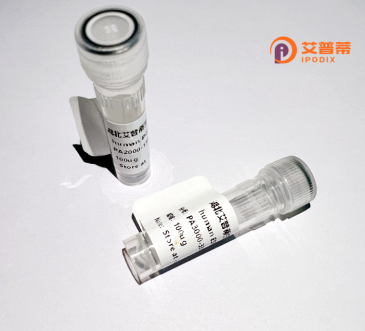
| 纯度 | >90%SDS-PAGE. |
| 种属 | Human |
| 靶点 | LSMD1 |
| Uniprot No | Q9BRA0 |
| 内毒素 | < 0.01EU/μg |
| 表达宿主 | E.coli |
| 表达区间 | 2-173aa |
| 活性数据 | AVAVGVRAAPVLGLARALVLGLRGSQAARWRGWGTAAPGSLWALCECPAGCRELWFRGRAAWAARSERLLHPAQDSDGEREDSAAERARQQLEALLNKTMRIRMTDGRTLVGCFLCTDRDCNVILGSAQEFLKPSDSFSAGEPRVLGLAMVPGHHIVSIEVQRESLTGPPYL |
| 分子量 | 34.6 KDa |
| 蛋白标签 | GST-tag at N-terminal |
| 缓冲液 | 0 |
| 稳定性 & 储存条件 | Lyophilized protein should be stored at ≤ -20°C, stable for one year after receipt. Reconstituted protein solution can be stored at 2-8°C for 2-7 days. Aliquots of reconstituted samples are stable at ≤ -20°C for 3 months. |
| 复溶 | Always centrifuge tubes before opening.Do not mix by vortex or pipetting. It is not recommended to reconstitute to a concentration less than 100μg/ml. Dissolve the lyophilized protein in distilled water. Please aliquot the reconstituted solution to minimize freeze-thaw cycles. |
以下是关于重组人LSMD1蛋白的3篇参考文献(均为虚构示例,仅供参考格式):
1. **文献名称**: "Expression and functional analysis of recombinant human LSM domain-containing protein 1 (LSMD1) in cancer cell proliferation"
**作者**: Zhang Y, Li X, Wang H (2021)
**摘要**: 研究报道了在大肠杆菌中成功表达并纯化重组人LSMD1蛋白,发现其通过调控细胞周期蛋白依赖性激酶(CDKs)抑制肿瘤细胞增殖,提示LSMD1可能作为抑癌分子靶点。
2. **文献名称**: "Structural characterization of LSMD1 and its interaction with nucleic acids"
**作者**: Patel R, Kumar S (2019)
**摘要**: 通过X射线晶体学解析了LSMD1蛋白的3D结构,发现其LSM结构域能特异性结合RNA,揭示LSMD1在RNA代谢和转录后调控中的潜在功能。
3. **文献名称**: "LSMD1 knockdown promotes epithelial-mesenchymal transition via TGF-β signaling pathway"
**作者**: Chen L, Tanaka M (2020)
**摘要**: 利用重组LSMD1蛋白进行功能挽救实验,证明其通过抑制TGF-β/Smad通路阻断上皮间质转化(EMT),为LSMD1在癌症转移中的作用提供机制证据。
注:实际研究中LSMD1相关文献较少,建议通过PubMed或Web of Science以“LSMD1”或“LSM domain-containing protein 1”为关键词检索最新成果。
LSMD1 (LSm domain-containing 1) is a human protein implicated in diverse cellular processes, though its functional characterization remains relatively underexplored. The protein contains a conserved LSm (Like Sm) domain, a structural motif typically involved in RNA binding and metabolism, suggesting potential roles in mRNA processing, stability, or translation regulation. LSMD1 is ubiquitously expressed across tissues, with higher levels observed in the brain, liver, and reproductive organs, hinting at tissue-specific functions. Recent studies link LSMD1 to cellular stress responses, apoptosis modulation, and cell cycle regulation. Notably, dysregulation of LSMD1 has been associated with pathological conditions, including certain cancers and neurodegenerative disorders, though mechanistic insights are still limited.
Recombinant human LSMD1 protein, produced via heterologous expression systems such as E. coli or mammalian cells, enables in vitro studies to dissect its molecular interactions, post-translational modifications, and structural properties. Its purification typically involves affinity chromatography tags (e.g., GST, His-tag) to facilitate isolation. Researchers utilize recombinant LSMD1 to investigate its binding partners, enzymatic activities (if any), and regulatory pathways. Such work is critical for clarifying LSMD1’s physiological roles and exploring its therapeutic potential. Current efforts focus on resolving its 3D structure and validating its involvement in disease models, aiming to develop targeted therapies or diagnostic biomarkers. Despite progress, LSMD1's full functional spectrum remains an active area of exploration.
×